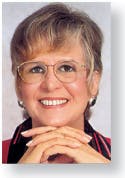The season of sharing is already upon us. Thanksgiving
is around the next corner, and celebrations of various religious
holidays extend through the New Year. Throughout these weeks, most folk
start serious deliberation on what gifts to give family and friends. But
gifts already given in months past are what is on my mind.
Under “Letters to the editor” this month, several
readers have sent in requested information about how to volunteer to
serve needy communities overseas. The inquiries and responses about how
to help people now suffering the results of recent weather-related
disasters make evident that what old Winston Churchill said is being
proven again: “We make a living by what we get, but we make a life by
what we give.”
Over time, we have featured stories of
medical-laboratory scientists who have traveled round the world to
teach, to learn, and, mostly, to improve the lives of others.
- Jeanne Isabel, Northern Illinois University, in
Bangladesh (July 2005, p. 44); - Marian J. Cavagnaro in Ethiopia and Tanzania with
Theresa M. Somrak, Barbara Hoffman, Wendy Arenson, Michele Best,
Perthena Lathchaw, Candice Golightly, and Todd Rueb (September 2005, p. 42); - Jane Boone, Extreme 2000 Research Project (September 2006, p. 46);
- Colleen Conley, Mercy Ships (September 2006, p. 46);
- Sylvia Waller who worked the Houston Astrodome lab during Katrina;
- Colleen K. Gannon and Cheryl A. Willoughby in Haiti (May 2008, p. 20); and
- Michele Harms who appears this month in “Letters” regarding her volunteerism.
As another “Englishman,” George Eliot [Mary Ann
(Marian) Evans], wrote: “What do we live for, if it is not to make life
less difficult for each other?” Medical laboratorians spend a large part
of their personal time doing just that. Unlike Sir Paul McCartney who
spent a well-publicized evening recently bringing a message of peace and
his music to Tel Aviv, med-lab folks labor in developing countries
without the convenience of a private jet. Unlike Bono, whose generous
deeds not only garnered his nomination for a Nobel Peace Prize but also
a retinue of reporters focusing on his good works, our dedicated
volunteers often accept a warm hug or a sincere handshake from their
audiences.
Our unsung lab heroes are toiling in the footsteps of
great humanitarians like Albert Schweitzer, a missionary doctor in
Africa. In his time, he was perhaps the world's foremost authority on
J.S. Bach; edited the first great modern edition of Bach's works; and
was an internationally famed organist. A distinguished theological
scholar as well, he spent the major portion of his life in what is now
Gabon where he designed, constructed, and operated a hospital for the
people of that land.*
Our heroes manifest the humility of Dag Hammarskjold,
who died in a plane crash in 1961 in central Africa where — as the
U.N.'s Secretary General — he had been negotiating a cease-fire between
the government of the Congo and secessionist rebels in Katanga. Only
after his death did the world learn of the private faith that had guided
his public role when his journal entries and poems written over decades
were published.*
Our heroes bring hope as did Sister Agnes Gonxha
Bojaxhiu, a Loreto Sister from Albania, to hundreds of thousands of poor
throughout the world. As individuals, our lab volunteers' deeds may
never attract the same amount of public admiration as did this nun who
became Mother Teresa,* but I would wager that, in their
travels, each of them has become the world to one child, one mother, one
frail elder in need of their skills and services.
Yes, it is that time of year when each of us
especially longs to be “the world” to someone. Let our gift this year be
a gift of self, a gift of spirit, to those we love and to those we have
yet to meet. Let us remember these examples of selfless actions of these
featured volunteers and those in our reading audience about whose good
deeds we are not yet aware. Philanthropic consultant Arthur Frantzreb
has said that ” … caring for one's fellow human beings is a belief in
the future … it is investing in that future … it is helping to make the
dream come true.”
And, after all, it is
the season to make dreams come true.
*All Saints: Daily
Reflections on Saints, Prophets & Witnesses for Our Time by Robert Ellsberg



